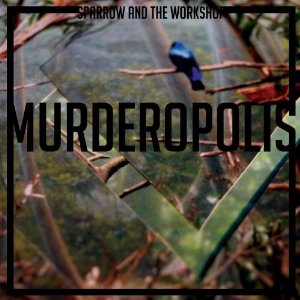It’s been a tough time of late for the humble sparrow. Once near-ubiquitous, they’ve seen a sixty to seventy per cent drop in their numbers since 1994, due to a changing environment, a rise in privileged predators like pet cats, and slim pickings where once there was an abundance of natural bounty to feast upon.
Click here to listen or buy from eMusic
Well, as in nature, so in music. 1994 and the dawn of Britpop may have been the last great boom time for alternative-oriented groups crossing over into the mainstream, having proper pop careers and making real money without – arguably – compromising their sound or outlook. Not so nearly twenty years on. While it’s a lot easier for anyone to have a part-time, no-money, bedroom label indie music existence, it’s a lot harsher environment for those bands trying to take it to the next level, to push into what’s left of the commercial arena for music while retaining their originality, integrity and ideals intact.
Murderopolis sounds like it’s trying to make that jump. The third album by the Glasgow trio, fronted by Irish-American vocal powerhouse Jill O’Sullivan, it follows a critically acclaimed debut (2010’s Crystals Fall) and a somewhat less well-received follow-up (2011’s Spitting Daggers). One might imagine then, that it’s quite a crucial release; one that will either set them back on track to greater success, or see them spiralling sadly towards the dumper on broken wings. After several listens, I’m still not sure which result the band have achieved, though being newly-signed to blog-based Edinburgh indie Song, by Toad, I’m sure they’re not under any threat of being dropped if Murderopolis doesn’t shift over a million "units". This would suggest then, that the steely rock sheen and gothic bombast, with which these formerly mild-mannered folkies have increasingly armoured themselves since their early EPs, is the result only of their own intent and ambition.
‘Valley of Death’ has a gothic scarecrow lope like the Cure’s ‘Lullaby’ hobbling through the valley of Americana, Edward Scissorhands in a tattered plaid shirt with the butchered bodies of the Handsome Family laid out in a bloody tableau behind him, each one symbolically impaled on their own pitchfork. ‘Darkness’ continues the, erm, dark mood, spiralling down into the forest (or ‘A Forest’) before slamming into an army-rock chorus AWOL from the same late-90s MTV regiment as Garbage, Skunk Anansie and- sorry! – the Cranberries (but they were only following orders!).
‘Odessa’ shifts gears even more dramatically, rousing itself from loose, country-flavoured lament to driving hard rock anthem in its closing moments, while first single ‘Shock Shock’ has the feel of a folk song that’s been gothed up, rocked over and pop polished until it doesn’t know which way to turn, wandering the streets in schizophrenic plumage scorned and attacked by every tribe to which it might once have belonged.
Yet it would be a shame if Sparrow and the Workshop were to find themselves cast out entirely and dying of neglect, solely for their occasionally confused eclecticism. ‘Water Won’t Fall’ is a fine, moody vignette that knows exactly what it’s doing, a glockenspiel riff dancing lightly over rolling drums and rumbling bass, O’Sullivan sounding somewhat like a young Kristin Hersh. The title track too effectively fuses groovy, easy-listening jazz motifs to an avant-rock frame, and the excellent ‘The Glue That Binds Us’ vaguely recalls Juliana Hatfield’s occasionally effervescent launch-pad combo the Blake Babies. Even the lyric has an appropriately grungey, mixed-up-kid negativity, a reluctant love song repeatedly qualified by the lyric, "But I don’t like you anyway, and I don’t need you in my life."
Second single ‘The Faster You Spin’ is a competent but somewhat unimaginative goth-rock stomp that will sound pleasant enough on afternoon radio, even if it does seem to be criticising its own calculating sell-out manoeuvres in lines like "every time you smile you look just like an actor… you’re nothing but a fame whore." ‘Flower Bomb’ would have made a better single actually, with more pop charm to its Motown-beat chorus and more subtle and interesting twists to its tense, minor-key melody that will repay repeated hearings.
"We said we didn’t need a thing, we said we’d live off our own hands," O’Sullivan sings, on closer ‘Autumn to Winter.’ "But all the gloss of living right began to fade as age crept in." She could be talking about the struggle and compromise required to keep a working band going in the modern world; trying to balance art against commerce, ultimately to the detriment of both. And yet it’s testament to Sparrow and the Workshop’s ability and vision that despite their missteps they still manage to sound better than most bands on both sides of the divide, be they pop-rock dollar-chasers or worthy-but-dull indie mumblers. It’s a tough world for little things alright, and I wouldn’t want to see this Sparrow become extinct just yet.


